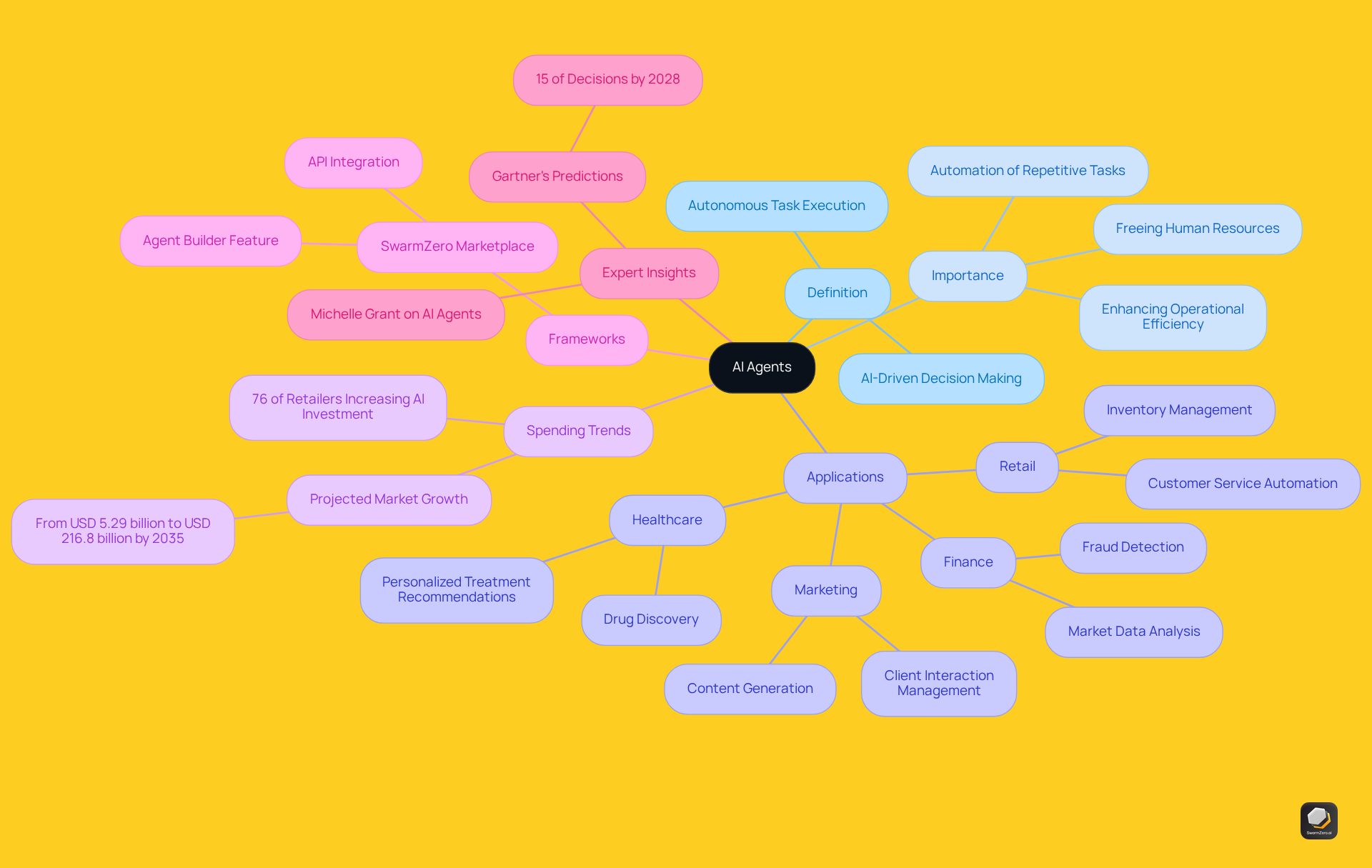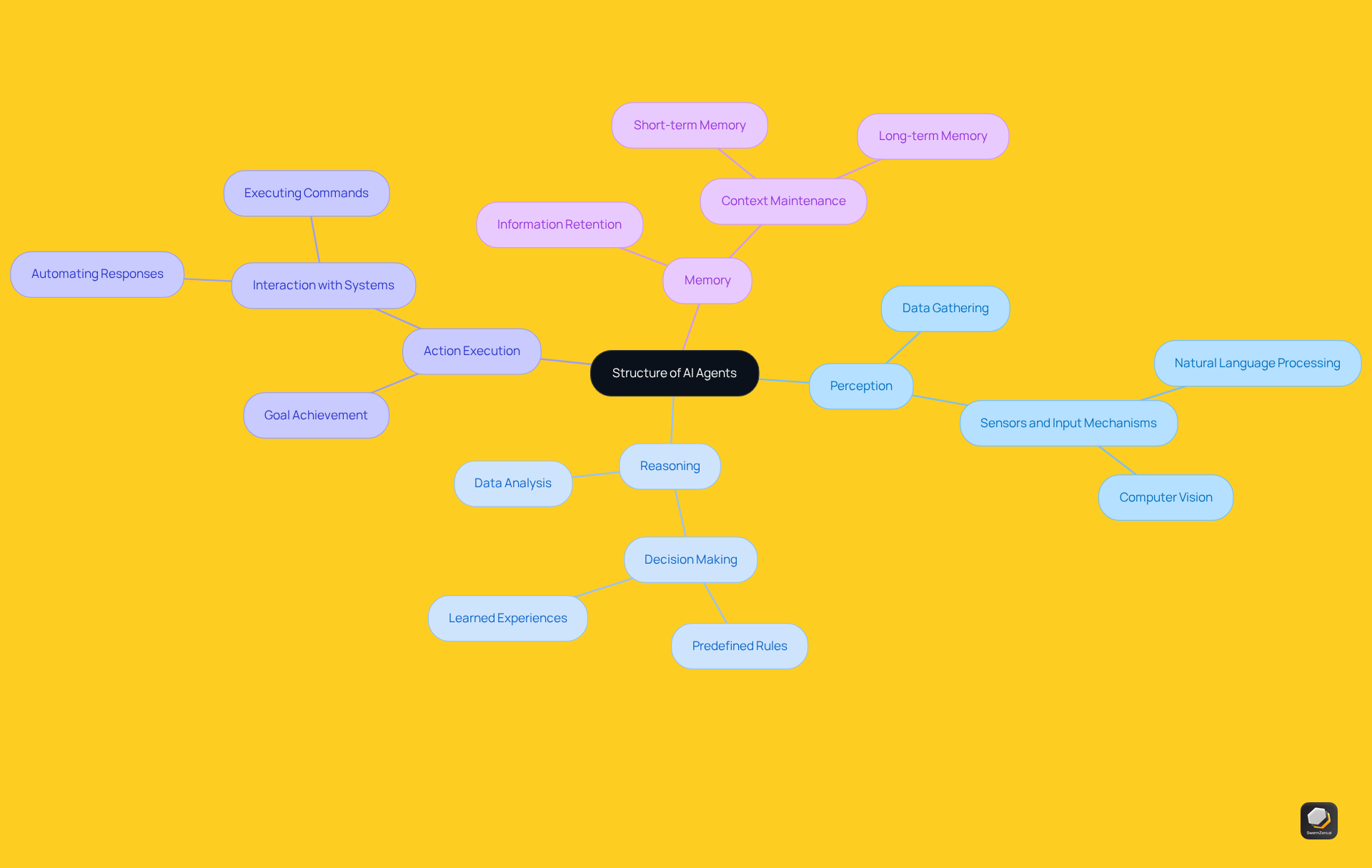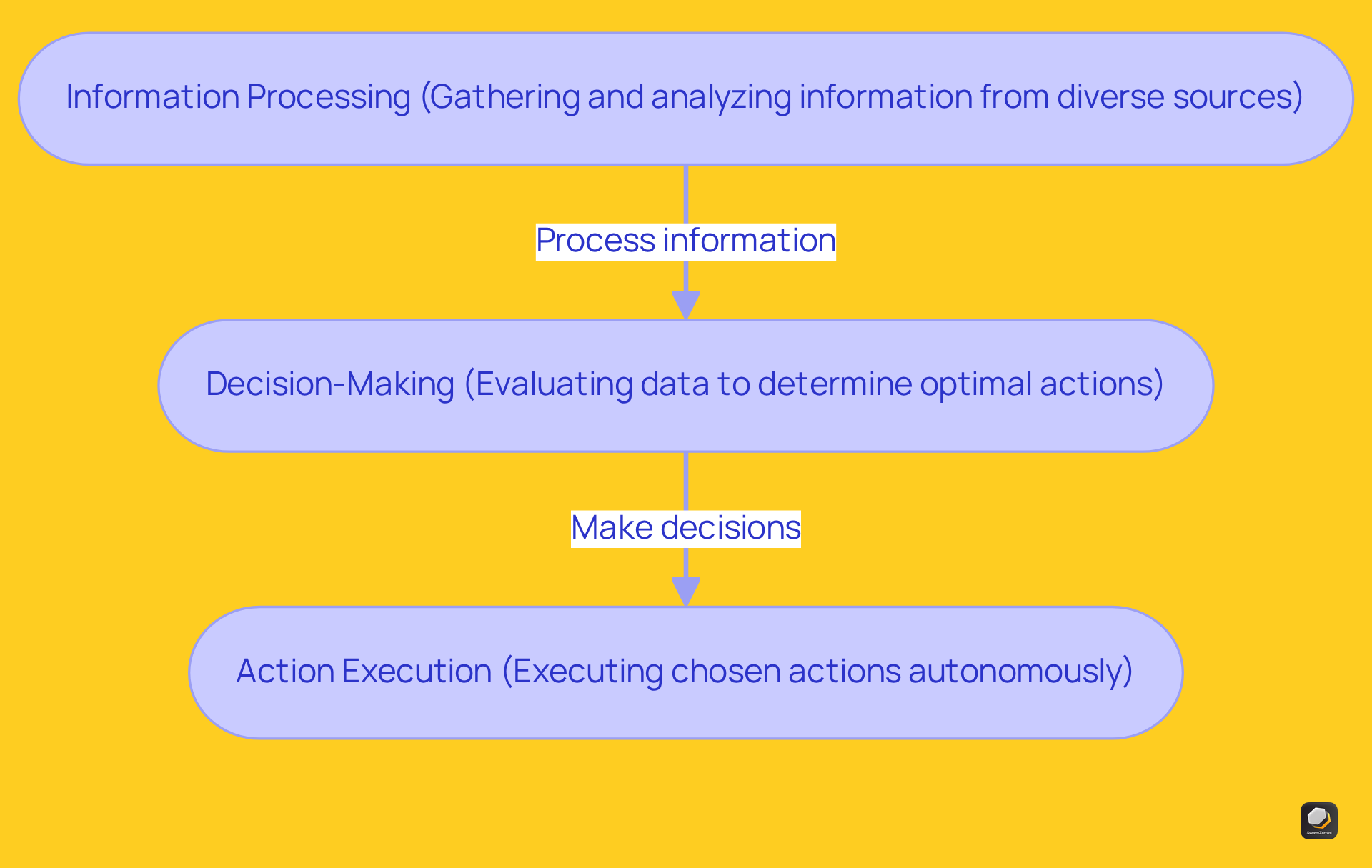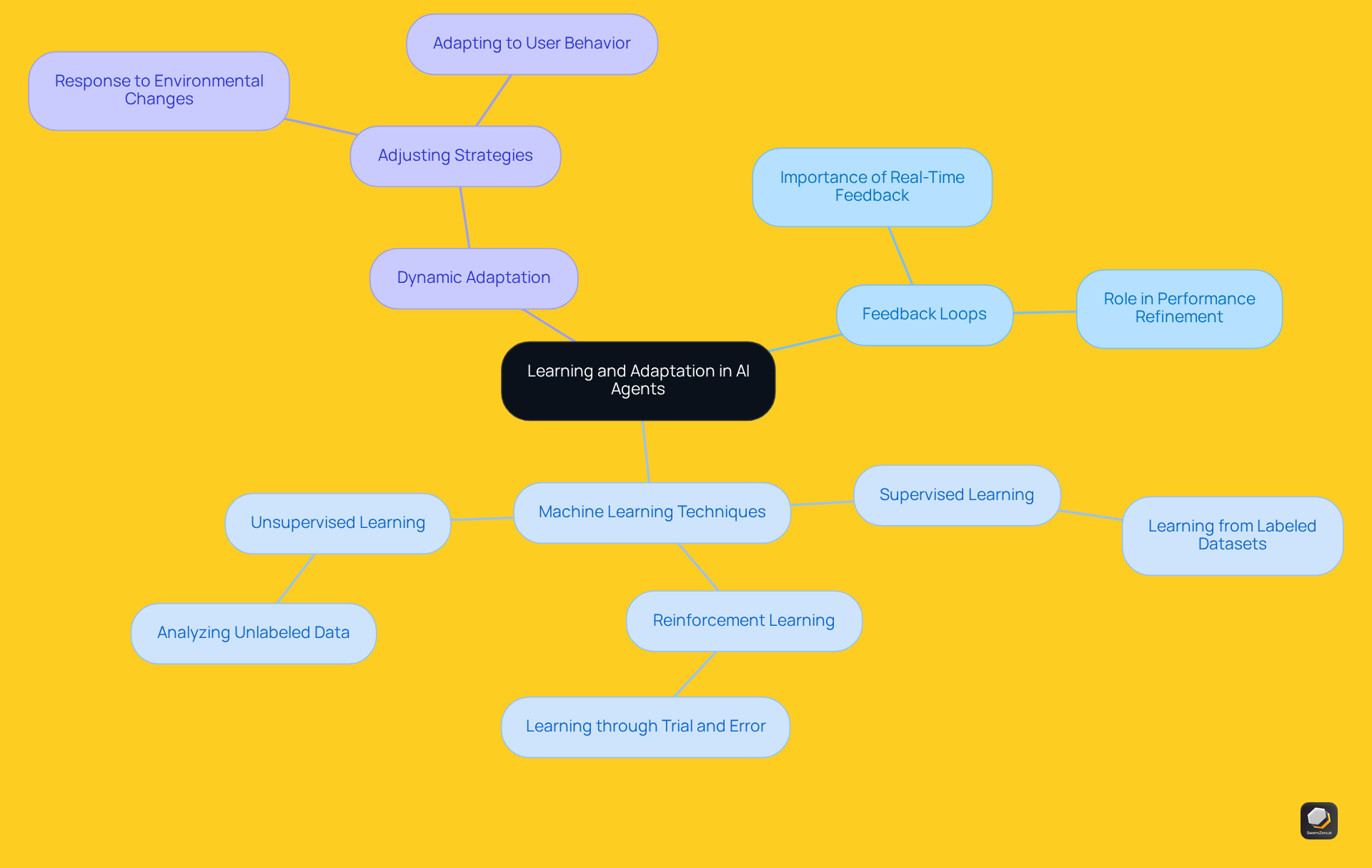Understanding the Structure of AI Agent for Effective Implementation
Discover the key components and operations in the structure of AI agents for effective implementation.

Key Highlights:
- AI agents are sophisticated software that autonomously execute tasks, leveraging AI to interpret environments and analyse data.
- They automate repetitive tasks, allowing human resources to focus on strategic initiatives, particularly in marketing and customer service.
- 76% of retailers plan to increase AI spending, indicating a growing reliance on AI for optimising marketing campaigns and customer interactions.
- Key components of AI agents include perception, reasoning, action execution, and memory, which enable effective functionality.
- AI agents process information, make decisions based on analysed data, and execute actions to enhance operational efficiency.
- Feedback loops and machine learning techniques allow AI agents to learn and adapt, improving their performance over time.
- By 2025, 90% of procurement leaders are expected to utilise AI technologies to enhance operations, highlighting AI's increasing importance in decision-making.
- SwarmZero's platform offers tools for developing AI agents, requiring proficiency in Python and understanding of version control and API usage.
Introduction
The rapid evolution of artificial intelligence has transformed the technological landscape, giving rise to AI agents—sophisticated software entities crafted to autonomously execute tasks and enhance operational efficiency. As organisations increasingly acknowledge the potential of these agents to automate repetitive processes and refine decision-making, grasping their structure becomes imperative.
What are the essential components that empower AI agents to learn, adapt, and perform effectively across diverse environments? This exploration delves into the intricate architecture of AI agents, unveiling how their capabilities can be harnessed to drive innovation and productivity across industries.
Define AI Agents: Core Concepts and Importance
AI programmes represent sophisticated software entities that, through the structure of AI agents, autonomously execute tasks for users or systems, leveraging artificial intelligence to interpret their environments, analyse data, and undertake actions aimed at achieving specific objectives. Their importance is underscored by their capacity to automate repetitive tasks, freeing human resources for more strategic initiatives.
In the marketing sector, for example, AI assistants can generate customised content, manage client interactions, and process vast amounts of data. This automation not only boosts operational efficiency but also allows teams to concentrate on higher-value activities.
As retailers increasingly invest in AI—76% plan to elevate their AI spending this year—AI assistants are becoming indispensable for optimising marketing campaigns, managing inventory, and enhancing customer service. Notably, the SwarmZero framework offers a robust marketplace for developing, monetizing, and automating business solutions, particularly through its integration with the Tavily API, which augments web search capabilities.
Practical applications highlight the transformative potential of AI systems; the structure of AI agents in customer service stands out as a primary use case in retail, automating responses to inquiries and managing returns. By integrating AI systems into their workflows, organisations can expect substantial improvements in productivity and operational efficiency.
Michelle Grant from Salesforce emphasises that AI representatives represent the next wave of retail AI evolution, underscoring their vital role in reshaping marketing strategies.

Explore the Structure of AI Agents: Key Components
The structure of AI agents comprises several essential components that work together to enable effective functionality:
- Perception: This refers to the agent's capability to gather data from its environment through various sensors or input mechanisms. For instance, AI systems can leverage natural language processing to understand user inquiries or utilise computer vision to examine visual information.
- Reasoning: Following data collection, AI systems engage in reasoning, analysing the information to make informed decisions based on predefined rules or learned experiences. This process is crucial, as it enables individuals to assess various solution paths and refine their methods over time, thereby enhancing their decision-making abilities.
- Action Execution: Upon reaching a decision, the individual executes actions to achieve its goals. This may involve interacting with other systems or users, such as automating responses in customer service or executing commands in a manufacturing environment.
- Memory: This component allows individuals to retain information from previous interactions, facilitating ongoing learning and performance enhancement. By maintaining context over time, representatives can improve their responses and adapt to changing conditions.
To effectively develop AI systems on SwarmZero's platform, a solid understanding of prerequisites is essential. Proficiency in Python, familiarity with Git for version control, and the use of Poetry for dependency management are critical. Additionally, obtaining API tokens is crucial for accessing SwarmZero's services. Users will also benefit from comprehensive support and resources available through SwarmZero's documentation and community channels.
Comprehending these elements is vital for creating efficient systems that reflect the structure of AI agents capable of adapting to diverse tasks and environments. For example, AI representatives in client support can manage inquiries and provide immediate assistance, significantly enhancing client satisfaction and operational effectiveness. Statistics indicate that 90% of businesses view AI tools as a competitive edge, with many reporting substantial cost reductions in customer service operations. As AI technology continues to evolve, the integration of perception, reasoning, and action execution will play a pivotal role in shaping the future of intelligent systems.

Understand AI Agent Operations: Processing, Decision-Making, and Action Execution
AI agents operate within a structured framework that encompasses several key processes:
- Information Processing: Agents gather and analyse information from diverse sources, including user inputs, sensor readings, and external databases. This foundational step is crucial for informed decision-making.
- Decision-Making: Through sophisticated algorithms, AI systems evaluate the processed data to determine the optimal course of action. This assessment considers multiple factors such as urgency, relevance, and potential outcomes, ensuring decisions are well-informed and contextually appropriate.
- Action Execution: Once a decision is reached, the agent executes the chosen action, which may range from simple tasks like sending an email to complex workflows involving multiple systems. This capability allows AI systems to function independently, significantly enhancing efficiency across various business settings.
The effectiveness of AI tools is underscored by recent findings, revealing that 90% of procurement leaders are either considering or actively utilising AI technologies to enhance operations by 2025. This trend highlights the increasing reliance on AI for improving decision-making and operational efficiency across sectors. For example, AI agents are increasingly employed in customer service roles, where they autonomously handle inquiries, process transactions, and provide real-time support, thereby streamlining operations and enhancing customer satisfaction.
Additionally, with SwarmZero's AI bot, individuals can interact seamlessly through Telegram. Commands such as /start to initialise the bot, /help for assistance, and /chains to list supported blockchains enhance participant engagement. Furthermore, users can interact naturally with the bot by posing inquiries such as 'Analyse the ETH market' or 'Show me Solana trading activity,' showcasing the bot's ability to comprehend and respond effectively. The bot's enhanced search capabilities are powered by the Tavily API, enriching the user experience further.
Overall, the systematic approach of the structure of AI agent—encompassing data processing, decision-making, and action execution—positions them as essential tools for organisations seeking to leverage AI technology for enhanced productivity and operational effectiveness.

Examine Learning and Adaptation in AI Agents: Continuous Improvement
AI agents are engineered to learn and adapt through several key mechanisms:
-
Feedback Loops: These agents receive continuous feedback on their actions, enabling them to evaluate the effectiveness of their decisions and make necessary adjustments. This iterative process is crucial for refining their performance and ensuring alignment with user expectations. A recent case study highlights that real-time feedback is essential for guiding AI decisions and enhancing learning.
-
Machine Learning Techniques: A variety of machine learning algorithms support the functionality of AI systems. For instance, supervised learning allows participants to learn from labelled datasets, while reinforcement learning enables them to enhance their capabilities through trial and error. By 2025, 85% of enterprises are expected to utilise AI, underscoring the growing reliance on these techniques for operational efficiency. Additionally, unsupervised learning plays a significant role, enabling entities to analyse unlabeled data and identify patterns, which is crucial for tasks like customer behaviour clustering.
-
Dynamic Adaptation: AI systems possess the ability to adjust their strategies in response to environmental changes or alterations in user behaviour. This adaptability is essential for maintaining effectiveness in achieving objectives, particularly in fast-paced business environments. Ongoing enhancement via these mechanisms not only increases the relevance of the representatives but also significantly improves productivity and operational efficiency across various sectors. As Jeff Bezos noted, AI agents will serve as digital assistants, helping us navigate the complexities of the modern world.

Conclusion
The effective implementation of AI agents is fundamentally rooted in a comprehensive understanding of their intricate structure and functionality. These sophisticated software entities harness artificial intelligence to automate tasks, significantly enhancing productivity and enabling human resources to concentrate on more strategic initiatives. By grasping core components such as perception, reasoning, action execution, and memory, organisations can develop AI systems that are not only efficient but also adaptable to diverse environments and tasks.
Throughout this article, we have shared key insights regarding the operations of AI agents, including their information processing, decision-making capabilities, and action execution. The importance of continuous learning and adaptation mechanisms—such as feedback loops and machine learning techniques—has been underscored, demonstrating how these elements contribute to the ongoing enhancement of AI systems. The integration of these components positions AI agents as essential tools for businesses aiming to harness the power of AI for operational efficiency and improved decision-making.
As industries increasingly adopt AI technologies, the significance of understanding their structure and implementation cannot be overstated. Embracing AI agents not only streamlines operations but also equips businesses with a competitive edge in a rapidly evolving landscape. By investing in the development and integration of AI systems, organisations can unlock new levels of efficiency and innovation, ultimately paving the way for a future where AI plays a pivotal role in driving success across various sectors.
Frequently Asked Questions
What are AI agents?
AI agents are sophisticated software entities that autonomously execute tasks for users or systems by leveraging artificial intelligence to interpret their environments, analyse data, and undertake actions to achieve specific objectives.
Why are AI agents important?
AI agents are important because they automate repetitive tasks, allowing human resources to focus on more strategic initiatives, thereby boosting operational efficiency.
How are AI agents used in marketing?
In marketing, AI assistants can generate customised content, manage client interactions, and process large amounts of data, which enhances the effectiveness of marketing campaigns.
What is the current trend in AI spending among retailers?
A significant trend is that 76% of retailers plan to increase their AI spending this year, indicating a growing reliance on AI assistants for various operational needs.
What role does the SwarmZero framework play in AI development?
The SwarmZero framework provides a marketplace for developing, monetising, and automating business solutions, particularly through its integration with the Tavily API, which enhances web search capabilities.
What are practical applications of AI systems in retail?
Practical applications include automating customer service responses to inquiries and managing returns, which significantly improve productivity and operational efficiency.
How do AI representatives impact retail marketing strategies?
AI representatives are considered the next wave of retail AI evolution, playing a vital role in reshaping marketing strategies, as highlighted by Michelle Grant from Salesforce.
List of Sources
- Define AI Agents: Core Concepts and Importance
- AI Agents Market Report 2025: Ready to Deploy AI Agents Capture Market Share, Customize Solutions on the Rise (https://globenewswire.com/news-release/2025/05/12/3078843/0/en/AI-Agents-Market-Report-2025-Ready-to-Deploy-AI-Agents-Capture-Market-Share-Customize-Solutions-on-the-Rise.html)
- 75% of Retailers Say AI Agents Will Be Essential to Compete (https://salesforce.com/news/stories/ai-agent-retail-trends-2025)
- Will 2025 Be the Year of the AI Agents? (https://internationalbanker.com/technology/will-2025-be-the-year-of-the-ai-agents)
- AI Agents (https://bcg.com/capabilities/artificial-intelligence/ai-agents)
- None (https://forbes.com/councils/forbestechcouncil/2025/03/07/ai-agents-in-2025-transforming-business-redefining-leadership-and-accelerating-digital-transformation)
- Explore the Structure of AI Agents: Key Components
- AI Agents: Evolution, Architecture, and Real-World Applications (https://arxiv.org/html/2503.12687v1)
- AI Agents Statistics: Usage Insights And Market Trends (2025) | SellersCommerce (https://sellerscommerce.com/blog/ai-agents-statistics)
- 100+ AI Agent Statistics Every Tech Enthusiast Should Know 2024 (https://blog.getodin.ai/100-ai-agent-statistics-every-tech-enthusiast-should-know-2024)
- AI Agents Statistics: Usage And Market Insights (https://litslink.com/blog/ai-agent-statistics)
- What are Components of AI Agents? | IBM (https://ibm.com/think/topics/components-of-ai-agents)
- Understand AI Agent Operations: Processing, Decision-Making, and Action Execution
- Celonis launches Process Collaboration Agent, powered by Rollio to Accelerate Decision-Making (https://celonis.com/press/celonis-launches-process-collaboration-agent-powered-by-rollio-to-accelerate-decision-making)
- AI Agents at Work: How Autonomous AI Could Become Your Next Coworker — Vestigo Partners (https://vestigopartners.com/news/2025/3/16/why-your-next-coworker-might-be-an-ai-agent)
- 90% of Procurement Leaders to Adopt AI Agents in 2025, According to Icertis Sponsored Study (https://icertis.com/company/news/90-of-procurement-leaders-to-adopt-ai-agents-in-2025-according-to-icertis-sponsored-study)
- Accenture Launches AI Refinery for Industry to Reinvent Processes and Accelerate Agentic AI Journeys (https://newsroom.accenture.com/news/2025/accenture-launches-ai-refinery-for-industry-to-reinvent-processes-and-accelerate-agentic-ai-journeys)
- Workday Unveils Next Generation of Illuminate Agents to Transform HR and Finance Operations (https://investor.workday.com/2025-05-19-Workday-Unveils-Next-Generation-of-Illuminate-Agents-to-Transform-HR-and-Finance-Operations)
- Examine Learning and Adaptation in AI Agents: Continuous Improvement
- 18 Inspiring Agentic AI Quotes From Industry Leaders (https://atera.com/blog/agentic-ai-quotes)
- What is AI Agent Learning? | IBM (https://ibm.com/think/topics/ai-agent-learning)
- Exploring AI Agents - Capabilities, Use Cases, and Implementation (https://brainvire.com/blog/understanding-ai-agents-features-applications-and-deployment)
- 100+ AI Statistics Shaping Business in 2025 - Vena (https://venasolutions.com/blog/ai-statistics)
- AI Agent Statistics for 2025: Adoption, ROI, Performance & More (https://plivo.com/blog/ai-agents-top-statistics)




